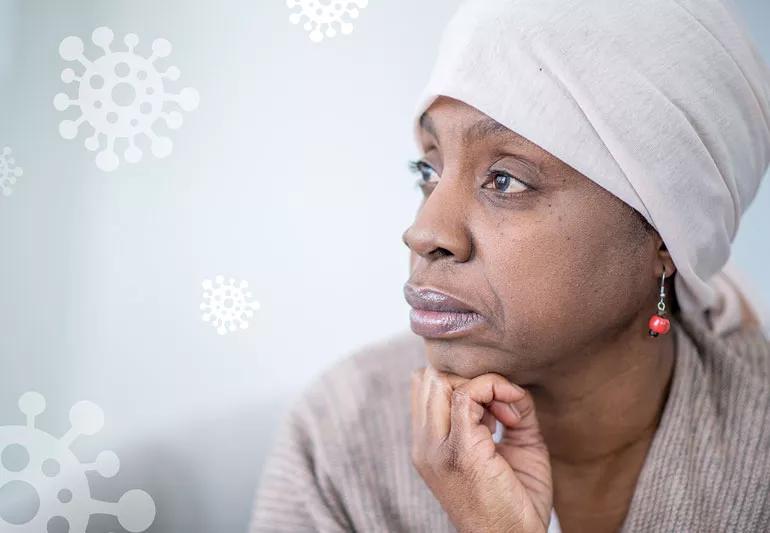Information for patients, survivors and families

Since the beginning of the COVID-19 crisis, one thing has been clear: People with a compromised immune system are at increased risk. And this population includes people dealing with a cancer diagnosis.
Advertisement
Cleveland Clinic is a non-profit academic medical center. Advertising on our site helps support our mission. We do not endorse non-Cleveland Clinic products or services. Policy
Cancer specialist and Director of Breast Medical Oncology Halle Moore, MD, offers insights about the coronavirus and cancer, and recommendations for how you can stay safe.
A: There are three reasons cancer may raise your risk of severe COVID-19 illness:
A: A recent report published in the journal JAMA Oncology suggested that individuals who had been diagnosed with cancer within the previous year had about seven times the risk of a COVID-19 diagnosis compared to those without cancer. The highest risks were observed in those with leukemia, non-Hodgkin lymphoma and lung cancer. Risk was further increased among African Americans with cancer – particularly those with breast, prostate and lung cancer.
Advertisement
A: In general, yes, but not always. Fever, cough and shortness of breath are common symptoms of COVID-19 infection and would be expected to be common in those who have cancer and COVID-19. But sometimes, people with cancer may not develop the high fever due to immune-suppressing treatments. We have also learned that COVID-19 symptoms are extremely variable, even among otherwise healthy individuals.
A: They need to take the same precautions and be extra vigilant. Family members or anyone they are exposed to while isolating must also follow the precautions, which are:
A: Patients need to discuss individual treatment plans with their provider. There are instances where treatments can be modified, but in most cases, necessary treatments can be delivered safely. Doctors and cancer centers are using innovative approaches, such as:
A: Doctors will consider many factors, including the stage and type of cancer (some are slow-growing), to determine the next steps of your care. They’ll also make adjustments they feel are safe. For example, your doctor may delay surgery and instead use a non-immunosuppressive treatment, or choose an oral chemotherapy drug to limit your trips to the cancer center.
Talk with your doctor about any concerns you have. We want you to feel confident and safe in your care.
A: It is vital for people who have cancer to prioritize healthy habits, such as:
Advertisement
Advertisement

Sign up for our Health Essentials emails for expert guidance on nutrition, fitness, sleep, skin care and more.
Learn more about our editorial process.
Advertisement

Chilblain-like skin lesions and rashes are mild (and rare) complications of many viral infections, not just COVID-19

Most can return to work or school when they’re symptom-free for 24 hours

Covering your mouth when you cough and staying home when you’re sick are a couple ways to help keep yourself and others COVID-free

This vital nutrient supports your health, but its role in COVID-19 prevention and treatment isn’t proven

Studies have shown promising results, but additional research is needed

Infection and inflammation can cause you to lose your voice and have other voice changes until you’re fully healed

A COVID-19 infection can bring on depression or anxiety months after physical symptoms go away

Just like the flu, COVID-19 continues to evolve every year with new and smarter variants

Although it could be used as a moisturizer, this new trend is not recommended

Communicating clear limits helps protect your time, energy and emotional well-being

High cholesterol can be genetic, but testing and treatment can lower your heart disease risk